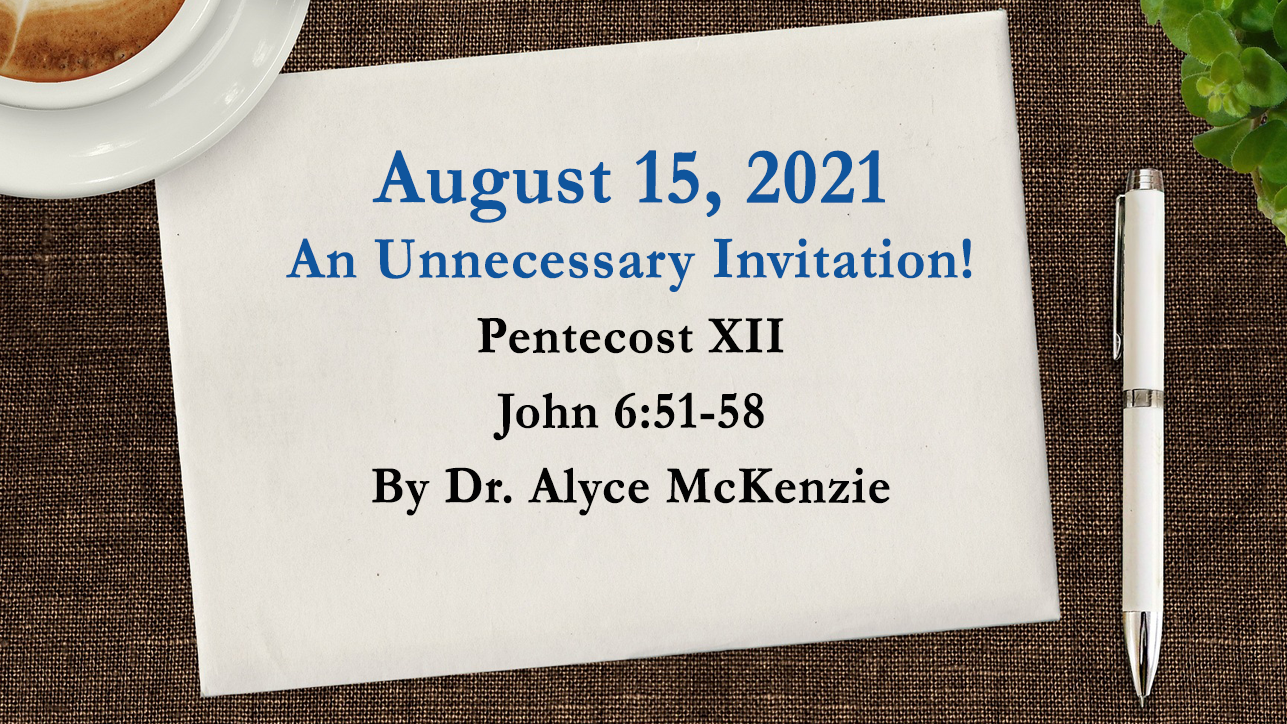An Unnecessary Invitation! - Reflections on John 6:51-58
by Dr. Alyce M. McKenzie on Tuesday, August 10, 2021

An Unnecessary Invitation!
Pentecost XII, August 15, 2021
Lectionary Reflections on John 6:51-58
As a child in Sunday school I sang the song "Into My Heart"
Into my heart, into my heart.
Come into my heart, Lord Jesus.
Come in today, come in to stay
Come into my heart, Lord Jesus.
Our passage this week promises that Jesus will abide in those who "eat his flesh and drink his blood" (Jn. 6:56). So inviting him in is an excellent first step. It's a good lesson for children to sing and remember.
The verb here translated abide (meno) occurs 40 times in John and 29 times in the Johannine letters. It means to remain, stay, abide, live, dwell, last, endure, continue. The noun mone means a dwelling place, room or home. (Out of 120 occurrences of the verb meno in the New Testament, 69 come from the Johannine tradition.) John's Gospel emphasizes that we are to invite Jesus to live in or abide in us.
Jesus is one in whom God dwells.
Do you not believe that I am in the Father and the Father is in me? The words that I say to you I do not speak on my own; but the Father who dwells in me does his works (Jn. 14:10).
Jesus is one who dwells in God.
As the Father has loved me, so I have loved you; abide in my love. If you keep my commandments, you will abide in my love, just as I have kept my Father's commandments and abide in his love (Jn. 15:9-10).
We are to invite him "into our hearts," to live in us. (6:56; 14:17, 23)
But John goes even further. As Jesus abides in God, so we already "abide in Jesus." We live in Jesus' heart.
As Paul tells the Athenians in Acts 17:27-28, "God is not far from each of us. For 'In him we live and move and have our being.' "
When Jesus turned and saw them following, he said to them, "What are you looking for?" They said to him, "Rabbi, where are you staying?" He said to them, "Come and see." They came and saw where he was staying, and they remained with him that day (Jn. 1:38-39).
In my Father's house there are many dwelling places. If it were not so, would I have told you that I go to prepare a place for you? (Jn. 14:2).
We are used to thinking about Jesus living in us and inviting him into our hearts. We are not so accustomed to meditating on the reality that we already live in Jesus' heart in Jesus’ house.
This is both comforting and challenging. Comforting because we don't have to do everything. We are no longer people who walk in darkness, but people who have come into the light. (12:46) Challenging because, as branches of the vine, we are expected to bear fruit. (John 15:5,7)
Thomas Merton (1915-1968) was a Trappist monk, poet, author of 70 books, social activist, and student of comparative religion. He was instrumental in establishing dialogue between Christians and Buddhists. His influential autobiography, The Seven Storey Mountain is a modern Confessions of St. Augustine.
He once met the Dalai Lama, the spiritual leader of the Tibetan Buddhists. The Dalai Lama confronted Merton with this question: "What do your vows oblige you to do? Do they simply constitute an agreement to stick around for life in the monastery? Or do they imply a commitment to a life of progress up certain mystical stages?"
After a few moments, Merton replied, "I believe my vows can be interpreted as a commitment to a total inner transformation of one sort or another, a commitment to become a completely new man (sic). No matter where one attempts to do this, that remains the essential thing" (Fenhagen, 4-5).
The Sunday school song, "Into My Heart" isn’t just for children. Wherever and whoever we are, we need to invite Jesus into our hearts, his light to illumine our darkness. Maybe the purpose of the repeated invitation is to remind ourselves that our guest is already in the house and that we already live and move and have our being in Christ. In that sense, it is a wonderfully unnecessary invitation!
Sources Consulted
James C. Fenhagen, More Than Wanderers: Spiritual Disciplines for Christian Ministry (Seabury Press, 1978).
